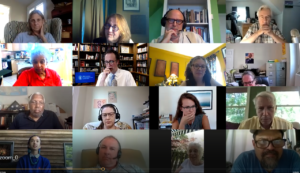
Some of the participants in the fourth installment of the ‘Civic Conversations’ program series, which took place virtually over Zoom.
“This is my fourth Civic Conversation,” said one participant, “but it is the first time that I thought the topic has a clear answer. Of course protest is patriotic.” There was broad consensus in the group that protest has a long American legacy and that it is, as was said, embedded in our Constitution and “in our DNA.”
But as the conversation developed, it became clear that this is not as simple a topic as it might seem. What happens when protests become violent? How do we feel about protests that persistently advocate for things we do not like? What do we want to say about the perspective that suggests that Americans need to “love it or leave it,” when it implies that protesting against the status quo is, in fact, unAmerican.
We began by talking about the legal roots of our rights to protest and the how these were not automatically codified, but needed to be advocated for. In fact, Rhode Island’s protest – refusing to ratify the Constitution – played a role in the adoption of the Bill of Rights.
We spoke more than a bit about protests becoming violent. “Sometimes,” said one participant, “you need to raise your voice to be heard.” We recognized that in America, a country that claims often to be a nation of laws, we will suggest an abhorrence of violence, and regularly delegitimize lawbreakers. But, one conversationalist reminded us, historically, there is a distinction between legal protests and peaceful ones. And our perceptions of violence are seen through a cultural and political lens. The lunch counter sit-ins during the Civil Rights Movement made lawbreakers of the protestors, but they were themselves completely peaceful. Except that the affront to the sensibilities of segregationists was perceived by many white people as an assault. It was noted that we are a country that easily condemns violence by the oppressed, even while it celebrates or approves violence by those in privileged groups.
We also discussed the fact that non-violence is not easy. We know that authorities can play on our discomfort with violence by provoking it in protests; it is extremely difficult to remain non-violent when you are being beaten, or gassed. Nonviolence requires deep commitment and training and was a particular strategy as one component of the Civil Rights Movement. Today, while still practiced across the country, it is not entirely unquestioned. “Asking an oppressed people to have no response to violence toward them may in itself be unAmerican,” said one participant. Another noted that the dynamic which suggests that “it is a shame that George Floyd was killed, but people should not destroy property” might better be framed as “it is a shame that people are rioting, but the police need to stop killing black people.” And while many in the group argued hard that non-violent protests are the best way to provoke social change, it was noted that when protests include violent confrontations, the violence, however begun, can become a component of how the movements make a difference.
We also spoke more than once of how history is a lens that can both focus and distort our understanding of protest movements in the past. The “conclusion” that Martin Luther King was a successful leader but Malcolm X was not does not withstand scrutiny. The casting of how and why people have protested, even going back to our earliest history, also does not always reflect a full and nuanced reality.
While it was suggested that that protest is part of our civic responsibilities, we were also reminded that protests that moved American to a more open, tolerant and safe country are not the only protests in our history. We currently have anti-mask protests happening in the country from those who think that concern about the pandemic is a hoax, sometimes violent anti-abortion protestors, and the Westboro Baptist Church, which marches and gathers to end America’s “tolerance” for homosexuality. We have white supremacist protests. Do we accept these, as well?
One questioner asked us, what is at stake if we don’t accept all protest? And then answered her own question with the suggestion that if we cannot accept protest as a component of the American practice of democracy, we deprive our nation of a source of direct citizen input into our culture and practice. In addition to voting, and the representation of our elected officials, protest is how we tell our government (and ourselves) how we want our country to go forward. Because things change, and have never been perfect, and this is part of the way we “right the ship.”
Finally, we asked ourselves about patriotism generally. Do we have anything to be proud of? If we see our history as a sweep of the terrible and the beautiful, as one participant invoked James Baldwin to suggest, can we allow ourselves to feel good about who we are, and what we are doing here? This is not an answerable question, and one that I suspect could easily occupy a whole other conversation. But James Baldwin’s thoughtfulness is a great way to end, so here is another of his comments about history.
“History, as nearly no one seems to know, is not merely something to be read. And it does not refer merely, or even principally, to the past. On the contrary, the great force of history comes from the fact that we carry it within us, are unconsciously controlled by it in many ways, and history is literally present in all that we do. It could scarcely be otherwise, since it is to history that we owe our frames of reference, our identities, and our aspirations.”
Civic Conversations will continue this summer and through the end of the year. Join us by email hrockwood@newporthistory.org to get on the invitation list.